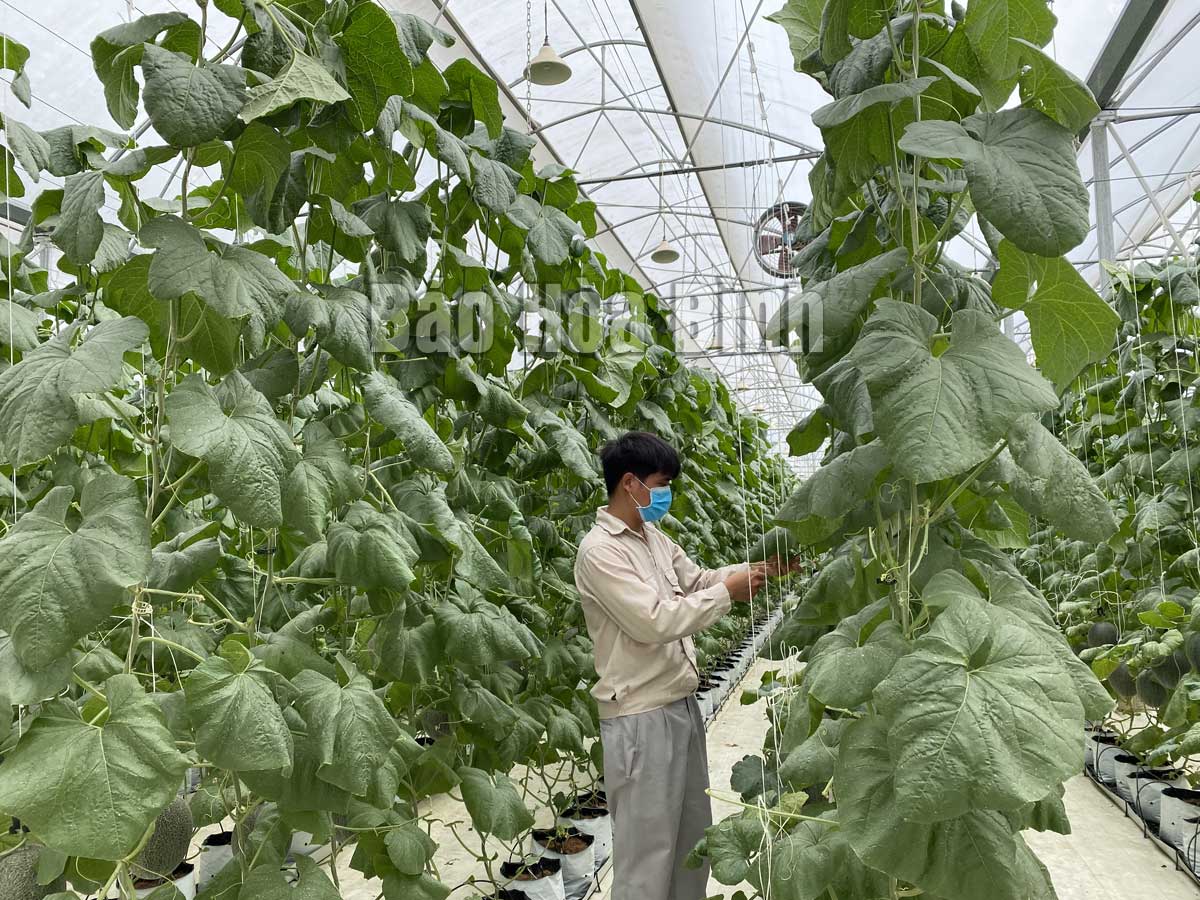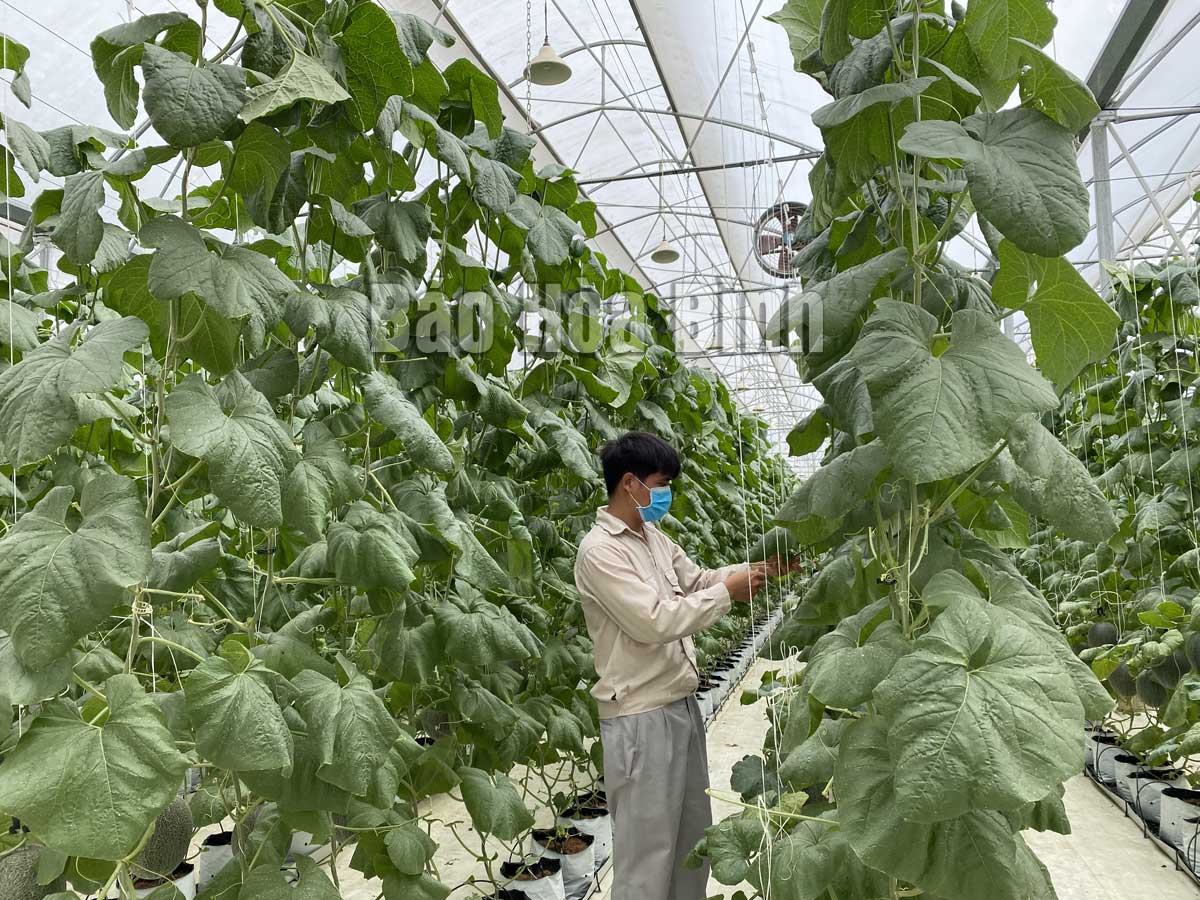
(HBO) – Authorities of Lac Thuy district in Hoa Binh province have paid special attention to developing clean agricultural production meeting VietGAP, GlobalGAP and organic standards, contributing to improving the quality and value of farm produce.
Truong Thinh Hi-tech Agriculture Investment JSC (Thong Nhat commune) invests in
growing Japanese Ichiba cantaloupe in accordance with GlobalGAP standards.
To ensure food safety, Lac Thuy district’s agricultural sector has implemented
many solutions to encourage local farmers to apply scientific and technological
advances in agricultural production to reduce production costs.
The district’s Division of Agriculture and Rural Development has regularly
coordinated with the sub-department of quality management of
agro-forestry-aquatic products to review agricultural production facilities
registered for VietGAP, GlobalGAP and organic certificates.
So far, the cultivation area certified with VietGAP and food safety standards
accounts for 32.5%, while the percentage of concentrated breeding
establishments certified with VietGAP makes up 8%.
Truong Thinh Hi-tech Agriculture Investment JSC (Thong Nhat commune) has
invested in growing Japanese Ichiba cantaloupe in accordance with GlobalGAP
standards. After two years, the model has brought outstanding economic
efficiency, with the rate of high-quality fruits reaching over 90%. Before
harvesting, each melon is checked for quality and sweetness, and stamped with
certificates of origin and traceability. Japanese Ichiba cantaloupeis
mainly sold in Hanoi and Hai Phong, and at clean fruit stores and
supermarkets.
Nguyen Van Quang, a technician of the Truong Thinh Hi-tech Agriculture
Investment JSC, said to achieve a good yield and quality, the firm always pays
special attention to strictly ensuring technical standards related to water,
seed, and fertilizer during the crop.
In parallel with cultivation, cooperatives and households in Lac
Thuy district have also promoted the livestock industry in accordance VietGAP standards.
Notably, Trinh Van Tuan’s family in Phu Thanh commune, which specialises in
raising chickens, averagely provides 12 tonnes of product and 24,000 eggs per
year.
Most of the products of livestock establishments and cooperatives in the
district have been sold at supermarkets and clean food stores in Hanoi, Hai
Phong, and Quang Ninh.
Vu Tien Sy, a member of Hai Dang hi-tech organic agriculture cooperative in An
Binh commune said, the fresh chicken product of the cooperative was recognised
as a provincial-level OCOP product. The cooperative provides about 63.7 tonnes
of chicken meat to the market every year, generating an average revenue of 30
billion VND, contributing to bringing stable incomes to its members.
Hoang Dinh Chinh, vice head of the Division of Agriculture and Rural
Development of Lac Thuy district, said clean agricultural production models
certified to meet VietGAP, GlobalGAP and organic standards, have helped better
the yield and quality of products.
To conquer demanding markets, farmers and businesses need to strictly comply
with commitments on quality and safety standards, and pay attention to
investing in packaging, design, and trademark registration to increase the
value of farm produce, he stressed./.
According to data from the Hoa Binh Provincial Party Committee, the industrial production index for the first six months of 2025 is estimated to have increased by 20% compared to the same period last year. This marks the highest year-on-year growth rate for this period since 2020.
In the first six months of 2025, Hoa Binh province’s export turnover was estimated at 1.145 billion USD, marking an 18.11% increase compared to the same period in 2024. Import turnover was estimated at $ 804 million, a 17.15% increase, which helped the province maintain a positive trade balance.
The lives of the ethnic minority farmers in Tan Lac district have gradually improved thanks to the new directions in agricultural production. This is a testament to the collective strength fostered through the professional associations and groups implemented by various levels of the district’s Farmers’ Union.
With the motto the "product quality comes first,” after nearly one year of establishment and operation, Muong village’s Clean Food Agricultural and Commercial Cooperative, located in Cau Hamlet, Hung Son Commune (Kim Boi district), has launched reputable, high-quality agricultural products to the market that are well-received by consumers. The products such as Muong village’s pork sausage, salt-cured chicken, and salt-cured pork hocks have gradually carved out a place in the market and they are on the path to obtaining the OCOP certification.
In the past, the phrase "bumper harvest, rock-bottom prices" was a familiar refrain for Vietnamese farmers engaged in fragmented, small-scale agriculture. But today, a new spirit is emerging across rural areas of Hoa Binh province - one of collaboration, organisation, and collective economic models that provide a stable foundation for production.
Maintaining growing area codes and packing facility codes in accordance with regulations is a mandatory requirement for agricultural products to be eligible for export. Recently, the Department of Agriculture and Environment of Hoa Binh province has intensified technical supervision of designated farming areas and packing facilities to safeguard the "green passport" that enables its products to access international markets.



